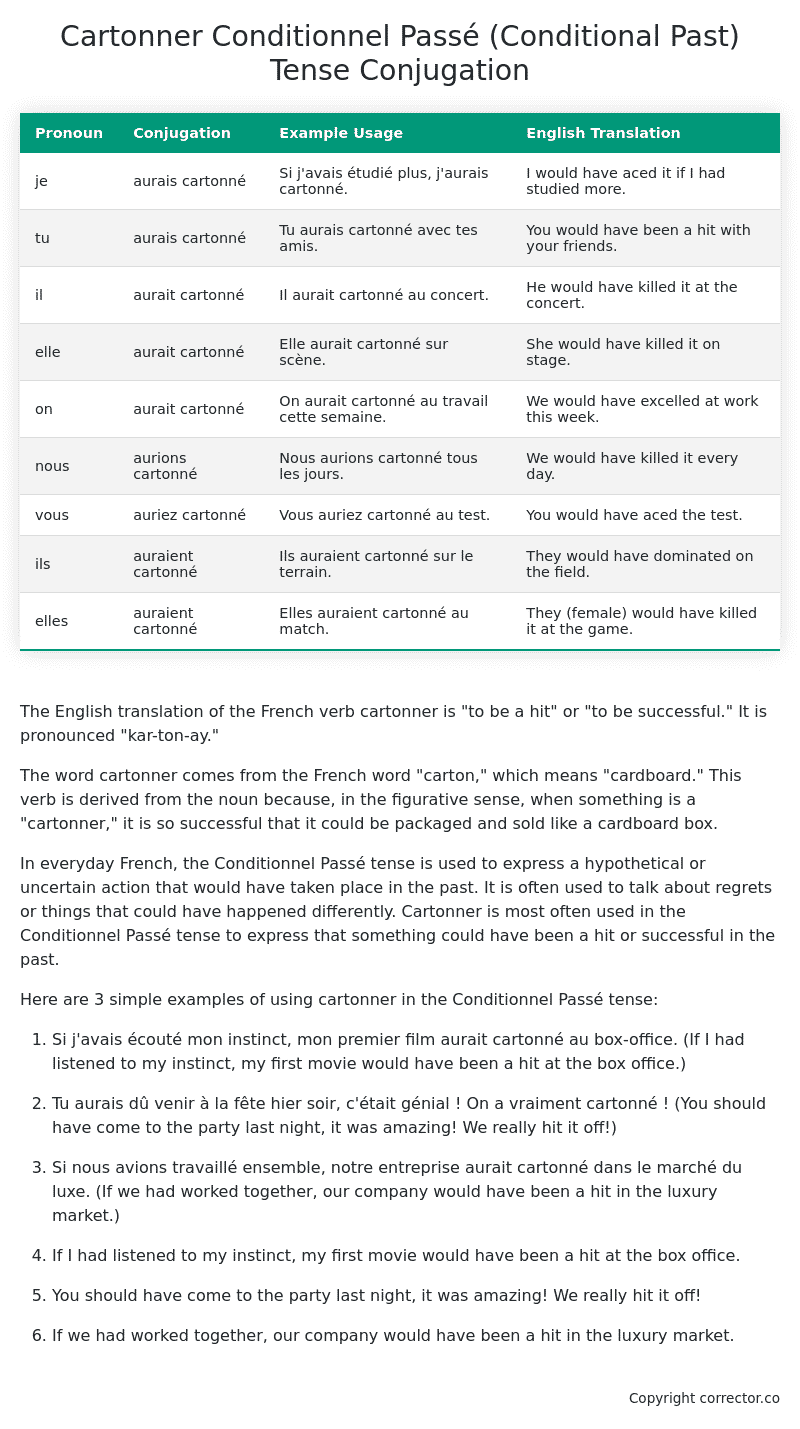Conditionnel Passé (Conditional Past) Tense Conjugation of the French Verb cartonner
Introduction to the verb cartonner
The English translation of the French verb cartonner is “to be a hit” or “to be successful.” It is pronounced “kar-ton-ay.”
The word cartonner comes from the French word “carton,” which means “cardboard.” This verb is derived from the noun because, in the figurative sense, when something is a “cartonner,” it is so successful that it could be packaged and sold like a cardboard box.
In everyday French, the Conditionnel Passé tense is used to express a hypothetical or uncertain action that would have taken place in the past. It is often used to talk about regrets or things that could have happened differently. Cartonner is most often used in the Conditionnel Passé tense to express that something could have been a hit or successful in the past.
Here are 3 simple examples of using cartonner in the Conditionnel Passé tense:
-
Si j’avais écouté mon instinct, mon premier film aurait cartonné au box-office. (If I had listened to my instinct, my first movie would have been a hit at the box office.)
-
Tu aurais dû venir à la fête hier soir, c’était génial ! On a vraiment cartonné ! (You should have come to the party last night, it was amazing! We really hit it off!)
-
Si nous avions travaillé ensemble, notre entreprise aurait cartonné dans le marché du luxe. (If we had worked together, our company would have been a hit in the luxury market.)
-
If I had listened to my instinct, my first movie would have been a hit at the box office.
-
You should have come to the party last night, it was amazing! We really hit it off!
-
If we had worked together, our company would have been a hit in the luxury market.
Table of the Conditionnel Passé (Conditional Past) Tense Conjugation of cartonner
| Pronoun | Conjugation | Example Usage | English Translation |
|---|---|---|---|
| je | aurais cartonné | Si j’avais étudié plus, j’aurais cartonné. | I would have aced it if I had studied more. |
| tu | aurais cartonné | Tu aurais cartonné avec tes amis. | You would have been a hit with your friends. |
| il | aurait cartonné | Il aurait cartonné au concert. | He would have killed it at the concert. |
| elle | aurait cartonné | Elle aurait cartonné sur scène. | She would have killed it on stage. |
| on | aurait cartonné | On aurait cartonné au travail cette semaine. | We would have excelled at work this week. |
| nous | aurions cartonné | Nous aurions cartonné tous les jours. | We would have killed it every day. |
| vous | auriez cartonné | Vous auriez cartonné au test. | You would have aced the test. |
| ils | auraient cartonné | Ils auraient cartonné sur le terrain. | They would have dominated on the field. |
| elles | auraient cartonné | Elles auraient cartonné au match. | They (female) would have killed it at the game. |
Other Conjugations for Cartonner.
Le Present (Present Tense) Conjugation of the French Verb cartonner
Imparfait (Imperfect) Tense Conjugation of the French Verb cartonner
Passé Simple (Simple Past) Tense Conjugation of the French Verb cartonner
Passé Composé (Present Perfect) Tense Conjugation of the French Verb cartonner
Futur Simple (Simple Future) Tense Conjugation of the French Verb cartonner
Futur Proche (Near Future) Tense Conjugation of the French Verb cartonner
Plus-que-parfait (Pluperfect) Tense Conjugation of the French Verb cartonner
Passé Antérieur (Past Anterior) Tense Conjugation of the French Verb cartonner
Futur Antérieur (Future Anterior) Tense Conjugation of the French Verb cartonner
Subjonctif Présent (Subjunctive Present) Tense Conjugation of the French Verb cartonner
Subjonctif Passé (Subjunctive Past) Tense Conjugation of the French Verb cartonner
Subjonctif Imparfait (Subjunctive Imperfect) Tense Conjugation of the French Verb cartonner
Subjonctif Plus-que-parfait (Subjunctive Pluperfect) Tense Conjugation of the French Verb cartonner
Conditionnel Présent (Conditional Present) Tense Conjugation of the French Verb cartonner
Conditionnel Passé (Conditional Past) Tense Conjugation of the French Verb cartonner (this article)
L’impératif Présent (Imperative Present) Tense Conjugation of the French Verb cartonner
L’infinitif Présent (Infinitive Present) Tense Conjugation of the French Verb cartonner
Struggling with French verbs or the language in general? Why not use our free French Grammar Checker – no registration required!
Get a FREE Download Study Sheet of this Conjugation 🔥
Simply right click the image below, click “save image” and get your free reference for the cartonner Conditionnel Passé tense conjugation!

Cartonner – About the French Conditionnel Passé (Conditional Past) Tense
Formation
Common Everyday Usage Patterns
Expressing Unreal Past Scenarios
Polite Requests or Suggestions
Expressing Doubt or Uncertainty
Interactions with Other Tenses
Conditional Present
Indicative Past Tenses
Conditional Future
Summary
Want More?
I hope you enjoyed this article on the verb cartonner. Still in a learning mood? Check out another TOTALLY random French verb conjugation!


